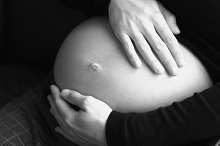Beautiful and healthy in pregnancy

Although pregnancy is not a disease, many symptoms that a pregnant woman has would a different person evaluate as a disease state. Upset stomach, back pain, fatigue, anxiety, depression, pressure variations, a constant feeling of the need to urinate ... However, future mother starts to be excited about her state and tries to eliminate the "disease symptoms" by improving her lifestyle.
During this period, you should take extremely good care about yourself. Nothing at this time is not as important as the future mother and her developing baby.
How much weight you should gain during pregnancy?
That woman gain weight during pregnancy is a fact with which the future mother cope. What is important is how much it will be. Misbelief that she can take on as many as she wants, because she will lose weight during the child care may be partly based on truth, but from a health perspective you should definitely care about your weight.
Obesity in pregnancy significantly increases the risk of various complications, such as gestational diabetes, problems with veins, high blood pressure, increased risk of certain birth defects of the fetus.
However, excessive effort to stay in shape entails many risks, such as low birth weight of a baby, birth defects caused by lack of vitamins and minerals in the diet, the risk of dying during childbirth.
Eating for two does not mean doubling your daily calorie intake. During the first three months, there is no need to interfere with the intake of calories. The slightly growing need for calories starts from the fourth month of pregnancy. Energetically difficult is a breastfeeding of the child. Although the right weight gain is very individual and is related to pre-pregnancy weight of women, an acceptable increase is from seven to sixteen kilograms in average.
Nutrients whose intake should be increased during pregnancy
Proteins - the main building material that child needs for development. Meats which could supply the body with too much fat should be avoided, it is appropriate to consume lean meat - poultry and fish. It is advisable to include more legumes and dairy products to your diet.
Calcium - an important ingredient for bone growth of the fetus. The dairy products are recommended, prefer white yogurt, fat-free cheese and curd. Legumes, nuts, sardines and poppy supplies enough calcium.
Magnesium - helps to remove gestational states of anxiety and depression. It can be found in yeast, nuts, almonds, bananas, dried apricots, lentils etc. Its deficiency often occurs in nocturnal leg cramps.
Zinc - a mineral you need in pregnancy is rising sharply, to about half the normal adult needs. In its absence there is a risk of premature birth and neonatal nerve injury. Located mainly in whole grains and fish.
Iron – your need to triple your dose of iron during pregnancy. It can be found mainly in the yolk, vegetables and in the intestines. It is difficult to ensure the adequate intake during this period. It is therefore recommended to take iron in form of dietary supplement from the fourth month.
Folic acid – it is important in preventing birth defects of nervous system. Its consumption reduces the risk of spina bifida. It is recommended to increasingly consume folic acid long before becoming pregnant. It is contained in soy, beans, spinach, yeast, broccoli, lettuce or cabbage. It is appropriate to supplement the diet with vitamin supplements during pregnancy. However, they must be properly combined and it is good when they are primarily intended for pregnant women. It is important to drink plenty of fluids, favor non-carbonated beverages, in reasonable quantities during the day – so you will not feel thirsty, which is the initial symptom of dehydration. However, the excessive intake of fluids is not appropriate, it results in unnecessarily load of the kidneys and the body degrades vitamins and minerals.
What to exclude from the diet during pregnancy?
Be careful during the selection of mineral waters - some have the inappropriate ratio of minerals and often contains a high proportion of sodium.
Do not take higher doses of vitamin A – there is the risk of birth defects of the fetus.
Alcohol, coffee, cigarettes - increasing the risk of miscarriage, cause increased heart beat of the child. Furthermore, the coffee in the body reduces the amount of magnesium in the blood. You should avoid drinks containing quinine (tonic), energy drinks, nectars, cola drinks - all these drinks contain a lot of artificial colors, flavors and other substances that burdens the body of pregnant women and negatively affect the developing fetus.
Sausages - contain hidden fat and a lot of salt.
Canned foods - contain a high proportion of sugar and salt
Physical activity during pregnancy
It is advisable to perform exercises to strengthen the pelvic muscles. They ease the childbirth and you recover faster after giving a birth. The basic element is the strain and release of the pelvic floor muscles often per day.
Exercises to strengthen the back muscles, particularly lumbar spine, helping to eliminate pain in this area and strong back muscles are good support for growing pregnancy belly.
Walking in the fresh air will help to strengthen the entire body, stays in nature have positive effect on the psyche of future mothers.
Swimming, light jogging, yoga and oriental dance are also recommended.
You should consult the exercises in pregnancy with your doctor. Difficulty depends on the stage of pregnancy. Exercise keeps the body in a form. That will help to manage the delivery and good shape pays off after childbirth.
All physical activities in which the body may go through jolts and shocks are prohibited for pregnant women (squash, tennis, skiing and team sports).
Pregnancy is indeed a challenging situation, yet it is good to enjoy it. Baby that grows in the tummy needs quality food and especially happy and peaceful mom.




